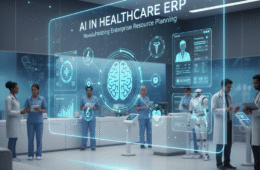
In today’s competitive business environment, organizations must adopt innovative technologies to stay ahead. Artificial Intelligence (AI) is transforming the way enterprises operate, and when integrated with Enterprise Resource Planning (ERP) systems, it creates a powerful combination for smarter decision-making.
If you are looking for an ERP Company in Dubai, you already know how crucial a robust ERP system is for streamlining operations.
Similarly, partnering with an experienced ERP Development Company in Kuwait can help businesses adopt AI-driven ERP solutions tailored to their unique needs.
AI-powered ERP solutions empower businesses with predictive analytics, automation, and real-time insights that allow leaders to make data-driven decisions faster than ever. Let’s explore why AI-driven ERP is the future of business management, its benefits, and how companies can leverage it for success.
Why AI in ERP is a Game-Changer
Traditional ERP systems were great at consolidating data and standardizing processes, but they often lacked intelligence. AI brings a new layer of intelligence to ERP by enabling systems to learn, predict, and recommend actions.
- Data-Driven Insights: AI analyzes massive volumes of data, turning raw information into actionable insights.
- Predictive Decision-Making: Machine learning algorithms can forecast trends like demand fluctuations, inventory requirements, and customer behavior.
- Process Optimization: AI automates repetitive tasks, reducing human error and freeing teams for strategic work.
By combining ERP with AI, businesses no longer just record transactions—they gain the ability to anticipate future outcomes and proactively respond.
Key Benefits of AI-Powered ERP Systems
1. Enhanced Decision-Making
AI uses historical and real-time data to provide accurate forecasts. This helps managers make quick, data-backed decisions, reducing guesswork.
2. Improved Productivity
Automation of routine processes like invoice approvals, purchase orders, and payroll ensures that employees focus on high-value tasks rather than repetitive work.
3. Cost Savings
AI-driven analytics identify inefficiencies and cost leakages, helping businesses reduce waste and allocate resources efficiently.
4. Better Customer Experience
AI-powered ERP systems personalize recommendations, predict customer needs, and ensure faster service delivery.
5. Scalability and Agility
As businesses grow, AI-enabled ERP systems scale effortlessly while continuing to deliver accurate insights.
AI Features to Look for in Modern ERP Systems
When selecting an AI-powered ERP solution, look for these must-have features:
- Predictive Analytics: Forecast demand, optimize inventory, and anticipate market changes.
- Natural Language Processing (NLP): Enables chatbots and virtual assistants for quick answers and smoother operations.
- Robotic Process Automation (RPA): Automates manual, repetitive workflows.
- Machine Learning (ML): Continuously improves forecasts and recommendations based on new data.
- Real-Time Dashboards: Provides instant visibility into key metrics for faster decision-making.
Industry-Wise Impact of AI-ERP
AI-powered ERP solutions are not limited to one industry. Here’s how they benefit key sectors:
- Manufacturing: Predictive maintenance reduces downtime, and AI optimizes supply chain operations.
- Retail: Personalized offers, smarter inventory control, and real-time demand forecasting improve profitability.
- Healthcare: AI-enhanced ERP ensures better patient data management and resource allocation.
- Finance: Risk analysis, fraud detection, and compliance monitoring are enhanced with AI.
- Logistics: Route optimization and predictive delivery scheduling reduce costs and delays.
How AI-ERP Enables Smarter Business Decisions
Business leaders often face the challenge of making quick decisions in uncertain situations. AI-powered ERP addresses this by:
- Providing real-time performance analytics for faster response.
- Identifying patterns and anomalies that might be missed by manual analysis.
- Recommending next-best actions to maximize outcomes.
For instance, if demand for a product is predicted to rise, AI-ERP can automatically increase purchase orders for raw materials, preventing stockouts.
Implementation Challenges and Solutions
Implementing AI-powered ERP comes with challenges, but they can be addressed:
- Data Quality: Clean and standardized data is crucial. Businesses must invest in data cleansing before ERP implementation.
- Change Management: Employees must be trained to adopt new systems. A structured change management strategy ensures smoother adoption.
- Cost Considerations: AI-ERP might seem expensive initially, but ROI is realized quickly through efficiency gains.
- Integration Issues: Choose an ERP provider experienced in integrating AI features with existing systems.
Future Trends in AI + ERP
The future of ERP is intelligent, connected, and autonomous. Trends to watch out for include:
- Generative AI: Assisting with automated report creation and workflow generation.
- Hyperautomation: Combining AI, RPA, and analytics for end-to-end automation.
- AI-Powered Collaboration Tools: Improving cross-departmental communication and decision-making.
- Advanced Predictive Modeling: Helping businesses prepare for economic changes and market disruptions.
Choosing the Right ERP Partner
Selecting the right ERP partner is as important as the technology itself. Look for a provider who:
- Has expertise in AI-driven ERP solutions.
- Offers customization based on your industry’s needs.
- Provides post-implementation support and training.
- Ensures scalability for future growth.
Speetrance, with its deep expertise in AI-powered ERP solutions, can help businesses in Dubai, Kuwait, and beyond build systems that drive real results. Their approach focuses on delivering tailored ERP solutions that maximize ROI and empower leaders with actionable insights.
Conclusion
AI-powered ERP solutions are no longer a luxury—they are a necessity for modern businesses seeking smarter decisions, cost efficiency, and competitive advantage. By combining the power of AI with ERP, companies gain predictive capabilities, streamline operations, and set themselves up for long-term growth.
Businesses that invest in AI-ERP today will lead the market tomorrow. Whether you are in manufacturing, retail, healthcare, or finance, the future belongs to those who embrace intelligent automation.
FAQs – AI Powered ERP Solutions
What is an AI-powered ERP system?
An AI-powered ERP system combines traditional ERP software with artificial intelligence, enabling automation, predictive analytics, and smarter business decision-making.
How does AI ERP improve business efficiency?
AI ERP streamlines workflows, reduces manual tasks, predicts trends, and provides actionable insights, helping businesses save time and resources.
What are the top benefits of AI ERP for businesses?
Top benefits include enhanced decision-making, real-time analytics, cost reduction, improved productivity, and better customer experience.
Which industries can benefit the most from AI-powered ERP solutions?
Industries like manufacturing, retail, healthcare, finance, logistics, and supply chain management can gain efficiency and actionable insights with AI ERP.
How do AI ERP solutions support smarter decision-making?
AI ERP analyzes historical and real-time data to forecast trends, detect anomalies, and recommend next-best actions for faster and accurate decisions.
What features should I look for in an AI ERP system?
Look for predictive analytics, machine learning, robotic process automation (RPA), natural language processing (NLP), and real-time dashboards.
Is AI ERP suitable for small and medium-sized businesses?
Yes, AI ERP solutions are scalable and can be customized for SMBs to optimize operations, reduce costs, and gain insights comparable to large enterprises.
How much does implementing AI ERP cost?
Costs vary depending on features, customization, and size of the business, but AI ERP delivers ROI through improved efficiency, automation, and smarter decision-making.
How long does it take to implement an AI-powered ERP system?
Implementation time depends on business complexity, data migration, and customization. On average, it takes a few months to fully deploy AI ERP.
10. How can businesses choose the right AI ERP provider?
Select a provider with proven expertise in AI-driven ERP, customization options, reliable support, scalability, and industry-specific experience to ensure maximum ROI.





